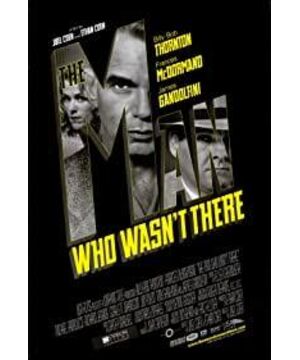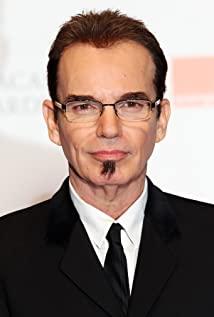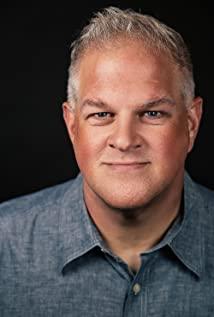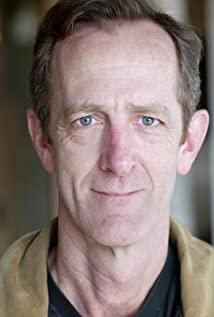Watching "The Absent" by the Coen brothers is like watching a series of stories centered on Ed through a glass cover, with endless feelings of desolation. The viewer watches the movie as an outsider, and the protagonist Ed in the movie also participates in his story as an outsider. Just by looking at the title, you probably know that this will be a film that tells the existence value of the person, but it will not only tell the existence value of the person. Ed in the film is a taciturn barber. In stark contrast to him is the constant chatter in the external environment, which shows that he has no sense of existence and right to speak in real life. Through a large number of character narrations, the director explained Ed and the stories surrounding him to the audience. In the indifferent, omniscient and eager subjective perspective, Ed’s monologue is like a nihilistic muttering to himself. The silence formed in contrast, giving a sense of sadness in the overall style. It is this abstract feeling that makes the film have the penetrating power of "Old Nowhere", and at some point it has emotional shock. Secondly, in the advancement of the film's story, Ed has always been regarded as an outsider who is excluded, and is absent. Whether it was the first case discussion with the lawyer Riden Sinai, who proactively said that he was the real murderer and was ignored; or he was interrogated and killed Clayton in the court. Ptolemy, listening to the lawyer Riden Sinad’s long-length defense of innocence while remaining silent, was knocked to the ground by his brother-in-law, and forced to ask "What kind of person are you?" without being allowed by the lawyer to get up from the ground to answer. Give up and get up, like a puppet at the mercy. Just like the Mersault in Camus’s "The Outsider", he was fictitiously formed into an image that he could not recognize, that is, Mersault, who always believed that he was innocent and didn’t care about everything, was forced to be described as a cruel Ruthless, deliberately murderous devil. Ed, who had clearly killed someone, was also portrayed by the lawyer as an innocent ordinary person, completely indistinguishable from the original appearance, as if it was just a symbol, a kind of nothingness. This, of course, can also directly refer to the dark, decadent, and unjust judicial system. It is not only reflected in the fact that if the case itself is not investigated in detail, it will give people unnecessarily charged charges. It is also reflected in the process of trial cases. Lawyers can always Do everything possible to convict or justify the defendant or plaintiff. Of course, it is impossible for you to see only one point in a film, and the director would not do that. The whole film can be divided into two parts, with the death of Zhuang Dave as the dividing line. The first part is mainly based on Ed's narration. There seems to be no inevitable connection between the series of events, dialogues and feelings he narrates. A sense of incoherence and absurdity. The second half is about the murder case. There are many uncertain factors in the development of the whole story, which gives people a sense of destiny. In the film Ed kills Zhuang Dave, the police takes his wife away, and he escapes unexpectedly; seeing the case is about to win, his wife commits suicide again; after the car accident, he was arrested by the police, thinking it was because of the killing of Zhuang Dave. , The result is related to the death of Clayton Tollever and so on. This feeling of uncertainty was supported by theory when attorney Clayton Tollever talked about the uncertainty principle for the second time during the second discussion of the case. And this part of the incident that Ann asked Ed to tell him about the spacecraft in the evening, and the spacecraft did appear in the end, causing a kind of audio-visual chaos to the viewers, and even a vague consciousness of doubting the authenticity of the event. This is exactly what the Coen brothers have always been. The style, by the way, satisfies the detective film plot rooted in the hearts of movie fans. In addition, the film also talks about the crime and punishment of the causal cycle, as well as the very philosophical discussion of looking at things. First of all, regarding the crime and punishment of the causal cycle, the relationship between the characters in the film and the ending of the characters are reflected in the film. Ed defrauded strong Dave’s money, Clayton Tollever defrauded Ed’s money, Clayton. Ptolev was killed by Dave Strong for cheating money. Ed killed Dave Strong. Although Ed escaped the charge of killing Dave Strong, it was also because of Clayton. Tollefo's death was sentenced to death, and he still failed to escape the punishment he deserved for the crime he committed. On the other hand, Ed's wife's suicide is also a punishment for the crime of derailment. Secondly, the film also touched on some opinions on how to look at things many times. For example, when she was looking for Ed, she said that "sometimes it is a curse to know a little bit more"; after the lawyer Riden Sinai talked about the uncertainty principle It also talked about “sometimes the more you observe, the less truth you know”. For example, Ed knows that his wife has cheated on Dave Zhuang, and will cheat money to trigger a series of things; Ed's wife knows that Dave Zhuang’s heroic image is bragging, so she has no regrets and regrets. For another example, the more the audience watches the movie, the more information they know, but they don't know the direction of the event. The lines are full of philosophical charm, which can always arouse some new thinking. The Coen brothers infused the film with consistent black humor, and at the same time, infused their own thinking about life in the film. To boldly express the absurdity of life, the uncertainty of destiny, and the crime and punishment of the causal cycle, the most fundamental thing is to base on people, pay attention to people's emotions, and express people's alienation and helplessness in this vast world.
View more about The Man Who Wasn't There reviews











